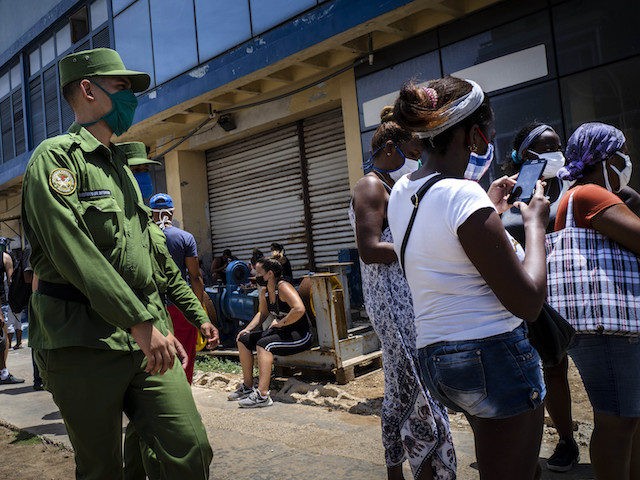A Cuban poet and political activist claimed this week that Cuban dissidents confined to their home during the Wuhan coronavirus pandemic are essentially under house arrest, with the Communist regime taking advantage of the conditions to further silence anti-government voices.
Amaury Pacheco lives in Alamar – less than ten miles east of Cuba’s capital, Havana – with his large family. They have been confined to their home under strict coronavirus lockdown measures for several weeks, which should apply to most Cubans on the island, but police, dissidents say, have been more intensely enforcing the measures against them. A poet and vocal critic of Cuba’s Communist regime, Pacheco told the Spanish newspaper Diario de Cuba that he has come to understand firsthand how the government has taken advantage of mandatory restrictions on people’s movement during the pandemic to further repress political dissent.
Forced home confinement during the pandemic has significantly hindered traditional methods of protest, according to Pacheco. Before, activists would stand up to repressive regimes in person, he said, using their bodies to occupy public space in a physical demonstration that spoke volumes.
Historically, Pacheco says, “[w]e take to the street. We break the mantra that the street belongs to the revolutionaries. We give it another meaning. We set aside those old tropes and present our physical bodies in their place.”
“[The new conditions] have created some anxiety for me because there are arrests [of dissidents],” he said.
Pacheco continued:
The government has taken advantage of Covid-19 [Chinese coronavirus] to convert our houses into prisons. I understand that there are many measures that are important, but a government that takes advantage of and treats all citizens as criminals … It detains activists, people who are against obscure decrees that go against freedom of expression. During and after Covid-19 [the Chinese coronavirus pandemic] what will we do? … Will our activism collapse because the government has gained ground and has detained us in our very homes?
The artist said that during the pandemic, almost all political activism in Cuba has been pushed online.
“[All the activism] has spilled over onto the internet. There is more communication now because people are there, Cubans in Cuba, and those in other parts of the world,” he said.
Pacheco said that political writing and poetry that the Communist regime might not allow people to share publicly remains free to be published in online forums.
“Now we present poetry online as perhaps we could not have presented it in public spaces. In that sense, it [the transition to online activism] has been a benefit,” the poet said.
Pacheco says he and his wife, also an artist, are homeschooling their four children – ages 8, 9, 11, and 12 – during the pandemic, adding that they had already been supplementing their children’s state-mandated education prior to the lockdown.
“The education they give at school is very bad. We have noticed in recent years that there were elements missing in [the state-mandated curriculum that] we have had to supply as parents,” the writer said.
Homeschooling prior to the pandemic was illegal in Cuba. Schools serve as pivotal indoctrination centers, teaching allegiance and zeal for the Communist Party. Cuban officials have famously imprisoned parents for homeschooling. Last year, Pastor Ramón Rigal and wife Ayda Expósito, were sentenced to two years and a year and a half in prison for insisting on homeschooling their children to avoid their indoctrination with communist values. Expósito recently concluded her sentence.
In his interview with Diario de Cuba, Pacheco also mentioned that he had witnessed the infamous bread lines that many Cubans are forced to stand in for state food rations. Pacheco said he and his family had stocked up on basic supplies prior to the pandemic and were fortunate enough not to have to wait in these lines yet. He said many people wait in long lines only to receive nothing as the food supplies run out before they reach the end of the line.

COMMENTS
Please let us know if you're having issues with commenting.